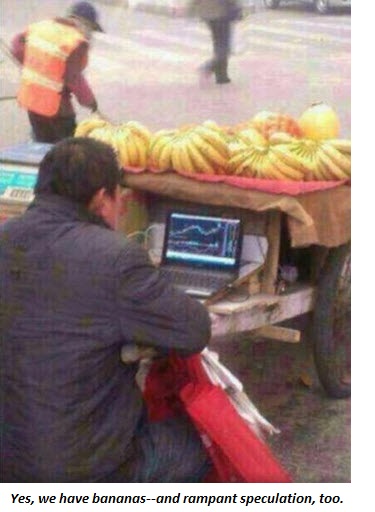Once global assets roll over for good, it’s important to recall that somebody owns these assets all the way down. These owners are called bagholders, as in “left holding the bag.”

Those running the rigged casino have to select the bagholders in advance, lest some fat-cat cronies inadvertently get stuck with losses.
In China, authorities picked who would be holding the bag when Chinese stocks cratered 40%: yup, the poor banana vendors, retirees, housewives and other newly minted punters who borrowed on margin to play the rigged casino.
Corrupt Chinese officials, oil oligarchs and everyone else who overpaid for flats in London, Manhattan, Vancouver, Sydney, etc. will be left holding the bag when to-the-moon prices fall to Earth.
Anyone buying Neil Young’s 2-acre estate in Hawaii for $24 million will be a bagholder.
(If nobody buys it at this inflated price, Neil may end up being the bagholder.)
Bond funds that bought dicey emerging market debt (Mongolian bonds, anyone?) and didn’t sell at the top are bagholders.
Everyone with bonds and stocks in the oil patch who didn’t sell last summer is a bagholder.
Everyone holding yuan is a bagholder.
Everyone who bought euro-denominated assets when the euro was 1.40 is a bagholder at euro 1.12.
Everyone with 401K emerging market equities mutual funds who didn’t sell last summer is a bagholder.
Everyone who reckons “buy and hold” will be the winning strategy going forward will be a bagholder.
Anyone buying anything with borrowed money is a bagholder. Leveraging up to buy risk-on assets like Mongolian bonds and homes in vancouver is brilliant in bubbles, but not so brilliant when risk-on turns to risk-off. As the asset’s value drops below the amount borrowed to buy it, the owner becomes a bagholder.
Anyone betting China’s GDP is really expanding at 7% and the U.S. economy will grow by 3.7% next quarter is angling to be a bagholder.





0 comments:
Post a Comment